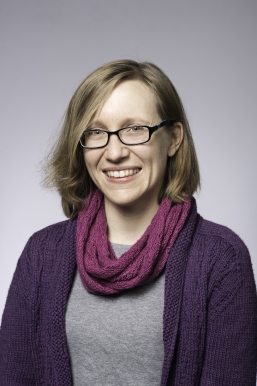
Whitney Gegg-Harrison, PhD
Associate Professor
PhD
- Office Location
- G121-H Rush Rhees Library
- Telephone
- (585) 275-5363
Office Hours: By appointment
Biography
Ever since childhood, I’ve been fascinated by all things relating to language and the mind, and especially with the process of taking thoughts once locked inside our own mind and communicating them to others using language. As I like to say, it’s magical - like telepathy, except that it actually works!
I studied linguistics and computer science as an undergraduate at The Ohio State University, where I also earned a Masters in computational linguistics, with work focused on pronoun resolution in natural language dialog systems (think Siri or Alexa). From there, I turned my attention towards better understanding how humans communicate with language, and earned my Ph.D in 2014 from the Department of Brain and Cognitive Sciences here at the University of Rochester. I love helping students and fellow faculty learn more about how their own minds work, how their readers’ minds work, and how large language models like the ones powering ChatGPT, Claude, and Gemini work, and helping them apply those insights to the work they do as writers.
Since 2010, I’ve been teaching a first-year writing class centered on the theme of “Language as a Window into the Mind.” In that class, we explore the relationship between language and thought through a variety of lenses: translation studies, psychology, linguistics, philosophy, neuroscience, science fiction, and AI. During the very first offering of the course, IBM’s Watson competed on Jeopardy. Every semester since then, the class has traced developments in computers that “do language.” When ChatGPT hit the scene in late 2022, my students and I had already been thinking about large language models and their potential for both good and ill, and I was well-equipped to offer guidance, reassurance, and important critical AI literacy skills to students and fellow faculty alike.
In 2019, I was given the opportunity to develop what had long been my “dream class”: an upper-level course on cognition and writing, in which students learn to think about writing as a cognitive process, to experiment on themselves using research-based strategies, and to ask questions about writing “like cognitive scientists.” In 2023, I developed another upper-level class, “Writing about and with Artificial Intelligence,” in which students first write and think about AI tools, with a particular focus on developing critical AI literacy, before they start exploring and experimenting with the tools as part of their own writing process. One of my assignments from this class, the “Critical Media Analysis Project,” is now featured as part of TextGenEd’s “Continuing Experiments,” an open-access resource for all who teach writing.
Beyond my own classes, I also provide workshop support for upper-level writing classes, especially in the Hajim school, as well as workshops for faculty on providing feedback on writing and how to pedagogically navigate our new “AI-infused” world. I’m always excited to talk about writing pedagogy, linguistics, cognitive science, and generative AI (and knitting!).
Highlights:
2024:
- Invited Speaker in the Kahn Liberal Arts Center at Smith College’s “Generative AI and Writing” seminar
2023:
- Goergen Award for Excellence in Undergraduate Teaching
- Interviewed by Joss Fong (for a Vox video) and Susan D’Agostino (for an “Inside Higher Ed” article) about AI & writing
Latest scholarly publication:
Rossen-Knill, D. F., Schaefer, K., Bayne, M., Gegg-Harrison, W. M., Crasta, D., and DeMauro, A. (2024). A multidisciplinary exploration of flow in writing. Taylor and Francis. DOI: 10.4324/9781003459460. Open Access: https://library.oapen.org/handle/20.500.12657/89505
